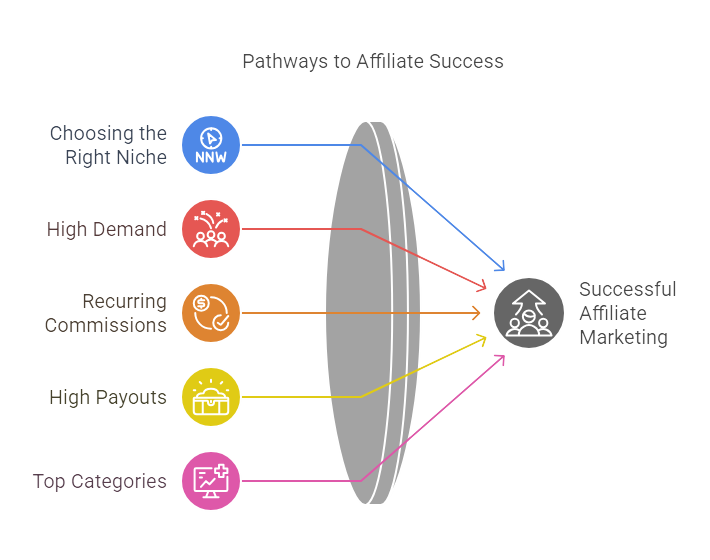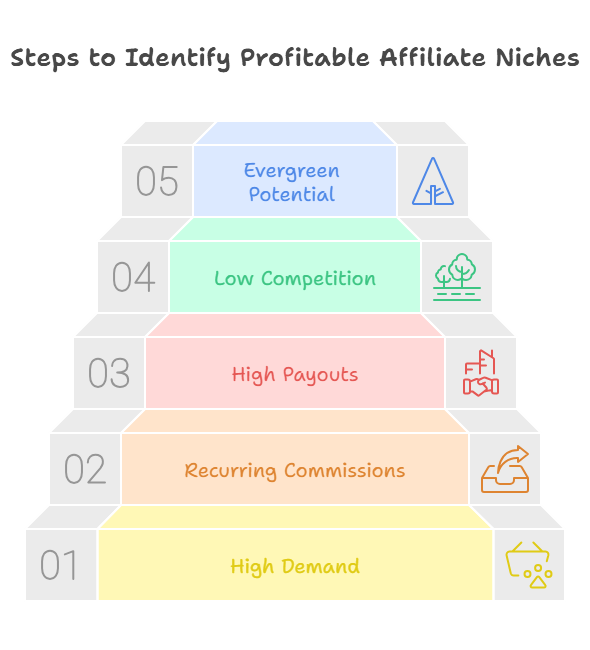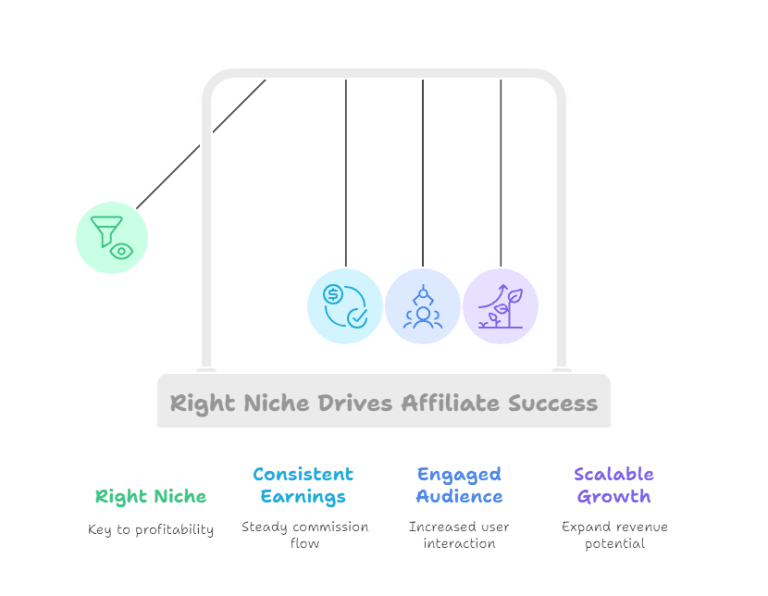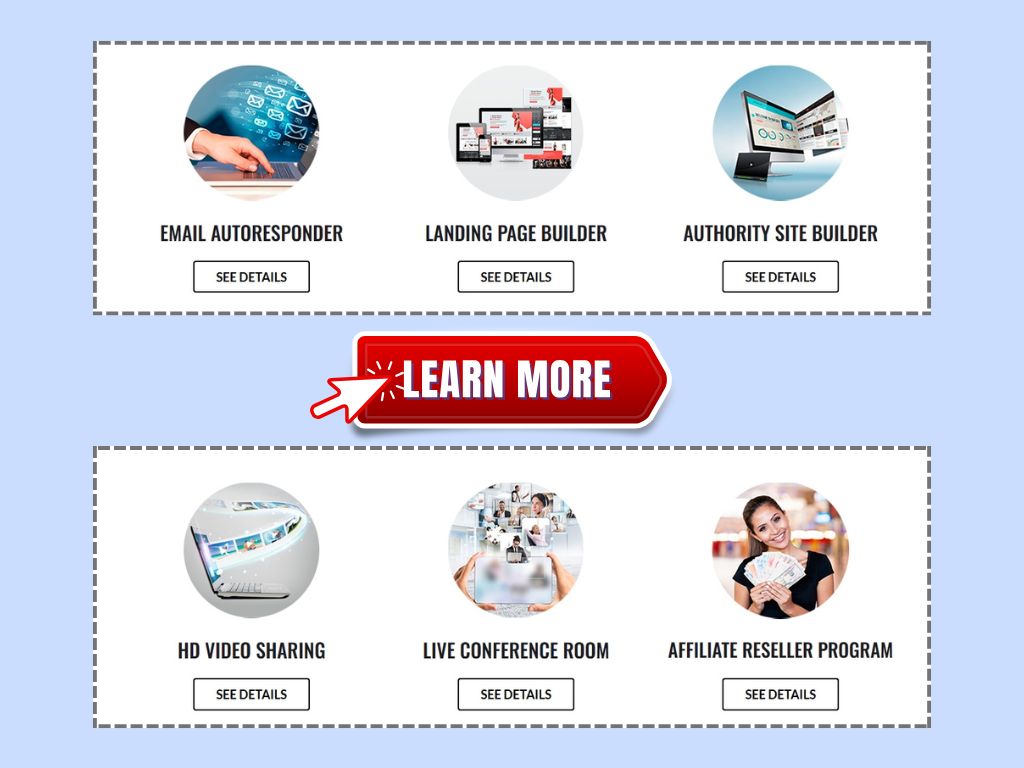Introduction
Choosing the right affiliate marketing niche in 2025 isn’t just about picking a topic you like, it’s the single biggest factor that determines whether your efforts generate steady, scalable income or get buried in competition.
A profitable niche gives you three things at once: built-in demand, affiliate programs that actually pay, and enough space to carve out your own authority. The wrong niche? It leaves you stuck producing content nobody reads and promoting offers nobody buys.
Whether you’re a beginner choosing your first niche or an experienced affiliate looking to expand into new verticals, this guide gives you the clarity and tools to make the right call.
Key Takeaways
Profitable Affiliate Niches in 2025 — What to Know
- The most profitable affiliate niches in 2025 offer high commissions, recurring revenue, and evergreen demand.
- Top-performing categories include finance, health, technology, lifestyle, and high-ticket digital programs.
- Choosing a niche that fits your audience, interest, and monetization goals is key to long-term growth.
- Low-competition niches still exist and can be great entry points for beginners with the right strategy.
- This guide breaks down niche opportunities, examples, affiliate programs, and tools to help you choose and grow your ideal niche.
Disclaimer: I am an independent Affiliate. The opinions expressed here are my own and are not official statements. If you follow a link and make a purchase, I may earn a commission.

What Makes a Profitable Affiliate Niche?
Not all niches are worth your time. Some look appealing on the surface but fall flat when it comes to generating real income. Others may not seem flashy, but quietly deliver consistent, scalable revenue over time.
Before you dive into content creation or affiliate offers, make sure your niche checks these essential boxes.

1. High Demand
A profitable niche begins with consistent demand. This means people are actively searching for information, asking questions, and spending money within that topic.
Without demand, even the best content or product won’t generate clicks or commissions.
To identify high demand:
- Use Google Trends to gauge long-term interest
- Explore keyword search volumes using tools like Ahrefs or SEMrush
- Look at forums, Reddit threads, or Amazon categories to see what people are struggling with or buying frequently
Strong demand gives you a built-in audience to serve and grow.
2. Strong Earning Potential
Some niches naturally offer higher payouts than others. A solid affiliate niche includes either high-ticket products, recurring commissions, or ideally, a mix of both.
Look for:
- Digital tools or software with monthly subscriptions
- Online courses, coaching programs, or services with premium pricing
- Affiliate programs that pay well above average and include upsells
The goal isn’t just traffic. It’s monetizable traffic an audience willing to invest in real solutions.
3. Evergreen Relevance
Trendy topics come and go. Evergreen niches stay relevant year after year, making your content more valuable over time.
Think of topics tied to fundamental human needs, like money, health, relationships, and education. These areas evolve, but they don’t disappear.
When your niche is evergreen:
- Your content has a longer shelf life
- You don’t have to constantly chase the next hot thing
- You build steady authority and trust with your audience
Choosing a niche with staying power sets you up for long-term results.
4. Clear Problems and Proven Solutions
Every strong niche is rooted in problems people want to solve. When those problems are clear and there are products that solve them effectively you have real affiliate potential.
The best niches are the ones where:
- Pain points are easy to identify and talk about
- There are trusted, well-reviewed products that solve those problems
- Your content can naturally connect the audience to those offers
If your audience doesn’t feel urgency or the products don’t deliver, you’ll struggle to convert traffic into income.
5. Space to Compete
Even if a niche is profitable, that doesn’t mean it’s ideal for you. Some spaces are so saturated that new affiliates struggle to get noticed.
That’s why it’s important to look beyond surface-level popularity and find angles with room to grow.
To do this:
- Focus on a narrower sub-niche or specific audience segment
- Explore emerging platforms or content formats others aren’t using
- Position yourself with unique insights, personal stories, or case-based content
Your niche doesn’t need to be completely untapped, but it should offer a path to stand out without having to outspend or outpost massive competitors.
💰 What makes a Profitable Niche at a Glance
| Factor | Why It Matters | How to Check |
|---|---|---|
| High Demand | Ensures people are actively searching and buying | Google Trends, keyword tools, forums |
| Strong Earning Potential | High-ticket or recurring commissions = scalable income | Check affiliate programs & payout rates |
| Evergreen Relevance | Content stays valuable year after year | Focus on core needs: money, health, education |
| Clear Problems & Solutions | Easy to match products to audience pain points | Look at Amazon reviews, Reddit, Quora |
| Space to Compete | Allows new affiliates to stand out | Find sub-niches, long-tail keywords, underserved angles |

How to Find The Best Profitable Niches
Once you understand what makes a niche profitable, the next step is finding one that checks those boxes and aligns with your interests, goals, and audience.
Here’s a simple, proven approach you can follow, even as a beginner.
1. Start with a List of Interests or Problems
The best niche ideas often start with what you already know, enjoy, or are curious about.
Think about:
- Topics you naturally talk about or research
- Problems you’ve solved (or are trying to solve)
- Products or services you’ve personally used and love
Write down 5–10 ideas, even if they seem broad. You’ll refine them in the next steps.
2. Use Google Trends to Validate Interest
Search each niche idea in Google Trends to see how interest has changed over time. You’re looking for:
- Stable or growing trends over the last 1–3 years
- Seasonal spikes (good to know, but may limit income consistency)
- Comparison between two similar niches to gauge which is gaining traction
Avoid niches that are trending down, unless you have a unique spin or sub-niche in mind.
3. Explore Affiliate Networks for Offers
Check affiliate platforms to see if there are actual programs in your niche. A great niche is one thing but without offers to promote, there’s no monetization path.
Start with:
- ShareASale
- ClickBank
- CJ Affiliate
- Impact
- Digistore24
Look for affiliate programs that:
- Match the niche and audience you’re targeting
- Offer good payouts (ideally $30+ per sale or recurring commissions)
- Have solid conversion metrics and reliable tracking
4. Analyze Search Demand with SEO Tools
You don’t need to be an SEO expert, but basic keyword research helps you avoid dead-end niches.
Use tools like:
- Ubersuggest (free or low-cost)
- Keywords Everywhere
- SEMrush or Ahrefs (for deeper insights if you’re ready to invest)
Search for terms like:
- “best [your niche] products”
- “how to get started with [niche]”
- “[niche] tips for beginners”
Look for:
- Search volume (ideally 1,000+ monthly searches for your core keyword)
- Low to medium competition (easier for new sites or creators to rank)
- Long-tail keywords (phrases with 4–6 words) that are more targeted
5. Check Real Communities and Questions
Go beyond the data. Visit places where real people hang out and ask questions.
Scan:
- Reddit (search niche-focused subreddits)
- Quora (look at what people ask related to your niche)
- Facebook Groups
- YouTube video comment sections
- Amazon product reviews
This helps you understand the language, needs, and frustrations of your potential audience and gives you content ideas that align with their intent.
6. Compare and Choose the Best Fit
After researching 2–3 ideas, stack them against each other.
Ask:
- Which one has a strong mix of demand, offers, and space to grow?
- Which one can I see myself consistently creating content about?
- Which one has a real audience with urgent needs and buyer intent?
You don’t have to get it perfect from day one but informed choices set you up to move faster and waste less time.

Top Affiliate Niches for 2025
These are the affiliate marketing niches that continue to dominate in 2025. They offer strong demand, healthy commissions, and space to carve out your own angle whether you’re a complete beginner or ready to scale.
Each niche below includes examples, monetization ideas, and affiliate programs worth exploring.
1. Finance & Wealth Niches 💰
Why It’s Profitable:
This niche consistently offers some of the highest commissions in affiliate marketing. That’s because the products and services like credit tools, investment platforms, and financial software often involve major life decisions.
When someone signs up for a loan, brokerage, or financial coaching program, the company earns big and you, as the affiliate, often get a generous cut. Many tools also offer recurring commissions, meaning you get paid monthly as long as the user stays.
Sub-niches to explore:
- Personal Finance: Focused on budgeting, saving money, and building emergency funds, great for beginners.
- Cryptocurrency & NFTs: A fast-moving space with passionate audiences, ideal for content creators who follow trends.
- Stock Market & Trading Platforms: Attracts more serious investors and tends to pair well with YouTube, blogs, or newsletters.
- Insurance & Loans: High-paying per-lead commissions make this appealing even if the buyer doesn’t purchase right away.
Affiliate programs worth exploring:
- Robinhood Affiliates: Trusted by beginner investors, easy to integrate into blog or video content.
- Coinbase Affiliate Program: Pays for user sign-ups and trades; perfect for crypto-focused content.
- LendingTree: Offers payouts for leads on mortgages, credit cards, and personal loans.
2. Health & Fitness Niches 🏋️♂️
Why It’s Profitable:
People are always investing in their physical and mental health, especially when they want fast, visible results.
This niche includes supplements, home fitness gear, apps, and online programs many of which offer repeat purchases or subscriptions.
Consumers often trust influencers or content creators with health advice, which boosts conversion rates. Plus, new trends and products keep the niche fresh.
Sub-niches to explore:
- Weight Loss & Diets: Always in demand; programs and supplements convert well with goal-driven audiences.
- Fitness Equipment & Supplements: Great for review-style content; high volume of Amazon and direct brand programs.
- Mental Health & Self-Improvement: A growing space apps, journals, and mindfulness tools work well with blog and social media content.
Affiliate programs worth exploring:
- Noom: Behavior-based health coaching that works well with storytelling and case-study content.
- MyProtein: Offers a wide range of products, frequent promotions, and solid commission rates.
- Calm Meditation App: Subscription model with strong brand recognition and user retention.
3. Technology & Online Services Niches 💻
Why It’s Profitable:
Tech tools especially software often operate on monthly subscription models. That means affiliates can earn recurring commissions over time, not just one-off payments.
From web hosting to SEO tools, these services are essential for businesses, creators, and side hustlers, which keeps demand high. The niche pairs well with tutorials, reviews, and comparison content that builds trust.
Sub-niches to explore:
- SaaS (Software-as-a-Service): Email marketing, funnel builders, design tools great for business and productivity content.
- Web Hosting & Domain Services: Ideal for bloggers, website tutorials, or “how to start a blog” guides.
- VPNs & Cybersecurity: Growing category with high urgency; performs well with privacy-conscious audiences and global reach.
Affiliate programs worth exploring:
- Bluehost: Beginner-friendly hosting with high commissions and strong name recognition.
- NordVPN: Converts well with international audiences and recurring income model.
- SEMrush Affiliate: Valuable for marketers, SEO bloggers, and digital service providers.
4. Lifestyle & Hobbies Niches 🎨
Why It’s Profitable:
People love spending money on what they enjoy. Lifestyle and hobby niches tap into emotional buying whether it’s travel, pets, photography, or gaming. The commissions may be lower per item, but the volume and loyalty can be much higher. Plus, these niches thrive on visual content and community-building, giving you multiple ways to connect with your audience.
Sub-niches to explore:
- Travel & Luxury Travel: Ideal for packing lists, gear guides, and hotel booking content.
- Photography & Camera Equipment: Review and tutorial content works well; often high-ticket gear with long-term use.
- Gaming & Streaming: Fast-growing space with passionate users; digital downloads, hardware, and memberships all monetize well.
Affiliate programs worth exploring:
- Booking.com: Pays for completed bookings on hotels, tours, and travel experiences.
- GoPro: Action camera brand with high brand loyalty and strong visuals for promotion.
- Amazon Associates: Broad product availability across virtually every lifestyle niche.
5. High-Ticket Niches 🔝
Why It’s Profitable:
High-ticket niches require fewer conversions to make serious money. These are often tied to premium products like coaching programs, software bundles, or business courses. Audiences in this space are ready to invest in outcomes, not just products. With strong content and trust, you can earn $100–$1,000+ per sale, and often build long-term relationships with buyers.
Sub-niches to explore:
- Luxury Real Estate: A niche for those with a network or authority in high-end markets.
- High-End Fashion & Accessories: Especially strong on social platforms and influencer-driven content.
- Online Business & Coaching Programs: Ideal for webinars, email funnels, and lead magnets.
Affiliate programs worth exploring:
- Sotheby’s Realty: High-end real estate with select affiliate offerings.
- Shopbop Fashion Affiliate: Premium fashion platform with luxury appeal.
- ClickFunnels: Recurring commissions and high average customer value.
6. Education, Skills & Career Growth 📘
Why It’s Profitable:
People are increasingly investing in themselves whether it’s learning a new skill, changing careers, or freelancing online.
Courses, certifications, and learning platforms offer solid commissions, and users see them as an investment, not just a purchase. Plus, this niche is ideal for blog posts, YouTube content, and email series that guide users step-by-step.
Sub-niches to explore:
- Freelancing & Remote Work: Teach others how to work online or become location-independent.
- Digital Skills & Certifications: Design, marketing, copywriting, coding great for content-driven educational funnels.
- Language Learning & Test Prep: Evergreen topics with built-in global demand.
Affiliate programs worth exploring:
- Udemy: Affordable and broad-reaching course marketplace.
- Coursera: Offers higher-ticket certifications and professional programs.
- Skillshare: Subscription-based platform with creative and career-focused content.
⬆️ Top Niches for 2025 at a Glance
| Niche | Why It’s Profitable | Best Sub-Niches | Example Programs |
|---|---|---|---|
| Finance & Wealth | High commissions, recurring payouts | Personal finance, crypto, loans | Robinhood, Coinbase, LendingTree |
| Health & Fitness | Evergreen, repeat purchases | Weight loss, supplements, mental health | Noom, MyProtein, Calm App |
| Tech & Online Services | Recurring SaaS income | Web hosting, SEO tools, VPNs | Bluehost, SEMrush, NordVPN |
| Lifestyle & Hobbies | Emotional purchases, loyal audiences | Travel, photography, gaming | Booking.com, GoPro, Amazon |
| High-Ticket | Fewer sales = big income | Real estate, luxury fashion, coaching | Sotheby’s, Shopbop, ClickFunnels |
| Education & Careers | People invest in growth | Online courses, certifications, freelancing | Udemy, Coursera, Skillshare |

Low-Competition Niches for Affiliate Marketing
While popular niches like finance, health, and tech offer high earning potential, they’re also highly competitive especially when you’re just getting started.
That’s why it’s smart to explore low-competition niches that still have strong demand but less saturation. These niches can help you gain traction faster, rank content more easily, and build a loyal audience without fighting against giant authority sites.
Here are several underrated or emerging niches that affiliate marketers should be watching in 2025:
- Digital Decluttering & Minimalism: As more people feel overwhelmed by tech and clutter, there’s rising demand for products and habits that promote simplicity think digital organization tools, planners, or decluttering courses.
- Eco-Friendly Living: Consumers are actively looking for sustainable alternatives from reusable home goods to zero-waste kits. This niche has loyal, mission-driven buyers and great crossover with health and lifestyle.
- Online Learning for Kids: Parents are spending more on educational tools and digital learning programs for their children. Think interactive apps, homeschool resources, and skill-building platforms.
- Pet Health & Natural Products: The pet niche is already strong, but natural supplements, raw food diets, and organic pet care products are still underserved in content and affiliate promotion.
- Sleep Optimization: This niche overlaps with health and productivity, but still feels underdeveloped in many affiliate circles. Products include sleep trackers, high-quality bedding, sleep coaching, and blue-light blockers.
- Productivity for Creatives: A growing audience of content creators, writers, and solopreneurs are looking for tools to organize their minds and projects. You can promote journaling tools, creative task apps, and focus techniques.
- Remote Work Tools for Teams: While solo freelancers get lots of attention, tools that help remote teams collaborate better, like async video tools, team productivity dashboards, or project management templates, are still ripe for affiliate positioning.
These niches are often overlooked, but they have real audiences, product-market fit, and room for content creators who want to build authority fast.
🏆 Affiliate Marketing Low-Competition Niches at a Glance
| Niche | Why It’s Growing | Example Products/Programs |
|---|---|---|
| Digital Decluttering | Rising overwhelm with tech clutter | Productivity apps, digital planners |
| Eco-Friendly Living | Sustainable living trend | Zero-waste kits, reusable home goods |
| Kids’ Online Learning | Parents investing in education | Skill-building apps, homeschool resources |
| Pet Health & Natural Products | Pet owners seeking healthier options | Organic food, natural supplements |
| Sleep Optimization | Overlaps with health/productivity | Sleep trackers, premium bedding |
| Productivity for Creatives | Growing solopreneur economy | Journaling tools, creative task apps |
| Remote Team Tools | Remote work expansion | Async video apps, project management templates |

How to Choose the Best Affiliate Marketing Niche for You
Knowing the most profitable niches is one thing. Choosing the right one for you is where things get real.
The truth is, not every niche is the right fit for every affiliate. Your background, interests, and goals all play a role in finding a niche that feels natural and actually makes money.
Here’s how to approach it strategically:
1. Balance Passion with Profitability
You’ve probably heard “follow your passion.” That’s good advice, if there’s demand and monetization behind it.
Ask yourself:
- Is this something I’d still be interested in 6 months from now?
- Can I consistently create content around this topic?
- Are people actively searching, spending, and engaging with this topic?
The sweet spot is where your interests overlap with market demand. That’s where content flows easier and earns better.
2. Validate the Niche Before You Commit
Don’t guess. Test.
Once you have a short list of potential niches, do some light research to see if they’re viable:
- Search on Google Trends: Look for steady or growing interest.
- Use keyword tools: Plug your niche into Ubersuggest, Ahrefs, or SEMrush and look at search volume + competition.
- Check affiliate platforms: See what offers exist on places like ShareASale, Digistore24, or ClickBank. If there are no good products to promote, the niche might not be ready.
- Look at forums and social media: Reddit, Quora, YouTube, Facebook Groups,what kinds of questions are people asking? What problems keep coming up?
You’re looking for patterns. If people are talking about it, struggling with it, and looking for tools to help, you’re likely onto something.
3. Choose Based on Leverage, Not Just Interest
Ask:
- Do I already have experience or knowledge in this niche?
- Do I know the audience personally or professionally?
- Can I tap into a network, group, or platform where this content will resonate?
The more leverage you have content ideas, access to an audience, firsthand experience the faster you’ll be able to create content that connects and converts.
4. Don’t Overthink It, Start Small
You don’t need to marry your niche forever.
Choose one that feels good enough to get started. You can always pivot, expand, or rebrand once you’ve gained momentum.
The goal is to start creating and testing, not to find a “perfect” niche before you take action.

⇄ Choosing the Right Niche (Do’s & Don’ts)
| Do ✅ | Don’t ❌ |
|---|---|
| Balance passion with profitability | Pick a niche just because it’s “hot” |
| Validate with data (Trends, SEO tools, affiliate offers) | Skip research and guess |
| Start small with one niche | Spread across multiple niches at once |
| Focus on buyer intent and problem-solving | Target audiences who only want free info |
| Be ready to pivot as you grow | Get stuck chasing a dead niche |
Final Thoughts On The Best Niches For Affiliate Marketing
There’s no shortage of affiliate marketing niches to choose from, but the best one is the one you’ll stick with, grow into, and profit from over time.
Whether you lean toward finance, health, tech, or a niche that’s still under the radar, your success comes down to three things: Clarity, consistency, and connection.
Start with a niche that fits your goals and audience. Validate it. Commit to showing up with valuable content. And stay open to adjusting as you grow.
You don’t need to get it perfect, you just need to get moving.
📌 Next Step: Read our Beginner’s Guide to Affiliate Marketing and start building your affiliate business today!

FAQs About Affiliate Marketing Niches
What is the most profitable affiliate marketing niche?
Finance, health, and technology consistently rank as the most profitable niches. These industries offer high-ticket affiliate programs, recurring commissions, and evergreen demand, making them ideal for long-term growth.
Can beginners succeed in high-paying niches?
Yes, but it may take more time and effort. High-paying niches are often competitive, so beginners should focus on a specific sub-niche, build trust through helpful content, and stay consistent. Starting in a smaller segment of a big niche can give you an edge.
How do I know if a niche is too competitive?
Use keyword research tools like Ahrefs, Ubersuggest, or SEMrush to analyze search volume and competition. If most results are dominated by major brands or high-authority sites, it may be harder to rank. Look for long-tail keywords and underserved questions within that niche.
Which niches offer the best recurring commissions?
SaaS (Software-as-a-Service) tools, web hosting, email marketing platforms, and online education programs often pay affiliates monthly for as long as a user stays subscribed. These niches are great for building stable, passive income over time.
Which niches offer the best recurring commissions?
SaaS (Software-as-a-Service) tools, web hosting, email marketing platforms, and online education programs often pay affiliates monthly for as long as a user stays subscribed. These niches are great for building stable, passive income over time.
Is it better to choose a niche I’m passionate about or one that’s trending?
Ideally, both. Passion makes content creation easier, while trending or evergreen niches help ensure demand and monetization. If you have to choose, lean toward niches with proven demand, but find a way to bring your personality or unique voice into it.
Can I promote multiple niches at once?
Yes, but it’s best to focus on one at first. Building authority and trust in a single niche is easier and more effective for SEO, email marketing, and audience growth. Once you have traction, you can expand into related topics or create niche-specific sub-brands.

0 Comments